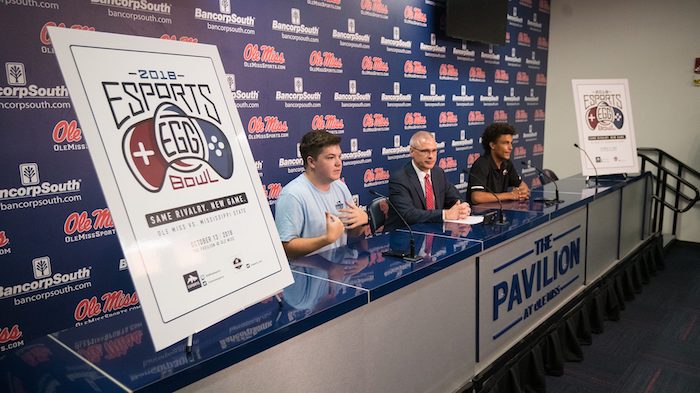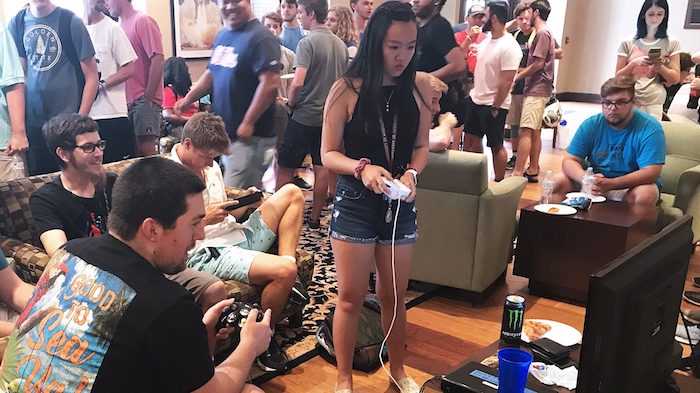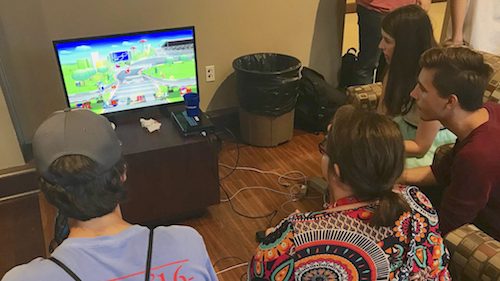UM, MSU announce inaugural Esports Egg Bowl for Oct. 13
SEPTEMBER 13, 2018 BY

At left, Cray Pennison, president of the Ole Miss Esports club, is joined by Noel Wilkin, University of Mississippi provost and executive vice chancellor, and Jason DeShong, president of MSU Esports, to announce the Esports Egg Bowl set for Sat., Oct. 13, in The Pavilion at Ole Miss. Photo by Kevin Bain/Ole Miss Digital Imaging Services.
The dream goes a little something like this: A few short years down the road, several thousand fans are gathered in an arena on the University of Mississippi campus, enthralled in a game. The crowd cheers and gasps as the tension builds, Hotty Toddy cheers echo and the announcer furiously spits out a play-by-play.
Instead of players hustling up and down a basketball court, though, the throng is zeroed in on two teams of people sitting in sleek, comfortable chairs, controllers in hand, facing off against each other in a video game. As the pixelated combat unfolds, with video boards beaming the battle around the packed arena, millions more are watching on monitors around the globe.
This is the National Collegiate Esports Tournament, an event that is now fictitious but could one day decide the top collegiate esports team in the country.
It is a dream that is arising, as the popularity of esports – competitive video game playing – is booming, with Ole Miss Esports, the university’s official esports organization, riding that surging wave into a bright future.
On Thursday (Sept. 13), Ole Miss and Mississippi State University announced the first-ever Esports Egg Bowl, an electronic matchup Oct. 13 in The Pavilion at Ole Miss between the two schools whose football rivalry stretches back to 1901.
The history of Ole Miss Esports is not nearly as lengthy. The club, designed to establish a community of gamers and promote competitive esports play on the UM campus, was founded in January 2017 by junior Cray Pennison, of Mandeville, Louisiana.
Pennison, an English major with a creative writing emphasis, serves as president of the club. Junior Gage Angle, from Colorado Springs, Colorado, (though a Tupelo High School graduate) is vice president and co-founder.
“The fact that Ole Miss pulled the trigger on (supporting an esports club) is a really smart move,” said Angle, an economics major. “They are taking it seriously. That’s making people realize that this is going to be real.”
The club, born out of a defunct League of Legends club on campus, convened with about five members at its first meeting. At a club social Aug. 23 in Brevard Hall, 85 people signed up for the club, with more than 100 students in attendance, chowing down on pizza and playing video games. More than 50 students attended the club’s first official fall meeting.
The explosion of the group mirrors the mushrooming popularity of esports around the globe. Newzoo, a games, esports and mobile market intelligence provider, forecasts that the total, global esports audience will grow from 395 million this year to 580 million by 2021.
Newzoo also states that the global esports economy will grow to $905.6 million this year, a year-on-year growth of 38 percent.

The Ole Miss Esports club was founded in January 2017 to establish a community of gamers and promote competitive esports play on the UM campus. Photo by Shea Stewart/Ole Miss Communications
Games are played on a trio of platforms – mobile (smartphone and tablets), PC and console games – in genres that include fighting and multiplayer online battle arena, first-person shooter or real-time strategy games. Some of the most popular games are “Call of Duty,” “Counter-Strike: Global Offensive,” “Dota 2,” “League of Legends,” “Overwatch,” “Rocket League,” “Super Smash Bros. Melee” and “Tom Clancy’s Rainbow Six Siege.”
Players go by game aliases. Pennison’s is “Syliris” because he likes the combination of sounds; Angle’s is “Geiji,” a Japanese pronunciation of his first name.
And while millions play the games, millions more watch online, thanks to sites such as Twitch and YouTube. Twitch, a subsidiary of Amazon, is a live-streaming video service and social site with an estimated daily viewership in the last 30 days of more than 1.1 million viewers. By comparison, ESPN – the leading U.S. basic cable sports network – had an average of 2.5 million total viewers in primetime for the week of Sept. 3.
Besides the free, live event sponsored by C Spire at the Pavilion, the Esports Egg Bowl will likewise stream online – time and place to be announced.
“One of the things I get is, ‘So you enjoy watching other people play video games?’” Pennison said. “I always joke back, ‘You like watching people play football as you sit on the couch?’ It’s the same thing.”
That growing worldwide fascination with esports, the popularity of which first bloomed in South Korea, is gaining notice in the U.S. ESPN has added esports to the growing list of sports it covers. And the Mississippi High School Activities Association added esports as a pilot program in 2018-19.
Esports also has become a varsity collegiate sport. In 2014, Robert Morris University in Illinois announced a scholarship-sponsored “League of Legends” team.
Since then, the esports scene has skyrocketed, with a national governing body known as the National Association of Collegiate Esports representing more than 90 institutions, ranging from tiny Culver-Stockton College in Missouri to larger schools such as the University of North Texas and Georgia State University.
In March, the University of North Georgia captured the first-ever Peach Belt Conference League of Legends Championship. The championship was the first of its kind in the nation as the PBC is the first NCAA conference to present a league title for esports.
About a year-and-a-half ago, Pennison approached the UM Department of Computer and Information Science requesting financial support for Rebel Rumble 2017, a campus club gaming tourney. The department, under the direction of Chair Dawn Wilkins, again assisted with Rebel Rumble this spring, and the club’s momentum was ignited.
“The timing just seemed right,” said Carrie Long, administrative assistant for the department and a self-described “ally” of the club. “Esports is undoubtedly a very popular event worldwide and can be used in the university setting in multiple facets.
“It is a good team-building unit, much the same as any team sport; it can be used to help motivate students to participate in leading roles as well as collaborate with others working toward common goals.”
Scholarly pursuits, including research into programming, psychology, kinesiology and virtual reality, also can be linked to esports, Long said.
And esports can be supportive in assisting a student’s mental health.
“Our hope is this will help students find others in the community who have similar interests, as well as support their interest but also make them accountable for going to class and encouraging them to be more social,” Long said.
Long and Wilkins approached Provost Noel Wilkin about administration support for the club. It did not take much to persuade him.
“This is about embracing the future: the future of online gaming, the future of sports and the future of understanding how the online world brings society together,” Wilkin said. “The future is here, competition is changing and the need for new talent is emerging. Ole Miss is changing the world.”

The popularity of esports – competitive video game playing – is booming, with an estimated global audience of 395 million in 2018. Photo by Shea Stewart/Ole Miss Communications
As the esports conversation accelerated over the summer, the idea arose for an Esports Egg Bowl, with Ole Miss and MSU battling it out for esports supremacy in the state.
Yes, the showdown will be a battle, because esports is competitive. The Ole Miss Esports club has finished highly ranked at some competitions, including two top 10 finishes in the Collegiate Battleground Association’s fall 2017 and spring 2018 PlayerUnknown’s Battlegrounds tournaments.
The idea is for the club to compete this year in the most popular esports games, with club members split into their respective games of interest and each game overseen by a chairman. Some games have multiple teams, and each team is coached by a captain.
Much like other team sports, esport captains develop game plans by researching opponents, searching for patterns in play or weaknesses, and poring over data. Players, especially in a multiplayer online battle arena game such as “League of Legends,” are always searching for that most efficient tactic.
“In the ‘Call of Duty’ team here, our practices consist of (playing training games against) other schools for at least 15 hours a week in-game, watching hours of video-on-demand to get intel on other school’s teams, and even writing down strategies and critiques of our own play to use in-game,” said Sergio Brack, alias “Physix,” a pre-pharmacy major from Chicago who is the club’s “Call of Duty” chairman.
All this takes time, and it takes a great amount of time to become even competent at a game. But esport players do not have to be athletic freaks of nature, able to hit a nasty 85 mph slider or slalom up and down a soccer field, dribbling the ball while avoiding opposing players.
“(Esports) seem more accessible than other sports,” Angle said. “You see athletes, and it is like, ‘Those guys are big and tall, and they have the genetics and they’ve been working out their whole lives,’ and then you see guys playing video games and it’s like, ‘Oh my God, I do that.’
“In esports, there is not much you can be born with for talent. You have to work hard. You have to get ahead of everybody.”
While athletic ability, beyond talents such as hand-eye coordination and quick reflexes, is not necessary for excelling at esports, a competitive spirit is beneficial.
“I noticed with esports, people who play competitively, when they were younger, they usually played sports so they have that competitive nature,” Pennison said. “And then they played video games, so it becomes where you can play the thing you really like to do – video games – and enjoy the high of being competitive and being good at it.”
Still, the games are essentially supposed to be fun, an escape from stress and the tasks of being a student. That is the role these games have played in Ole Miss Esports players’ lives since they started playing video games, which have been a near-constant since birth.
Austin Turner, a junior computer science major from Yazoo City, remembers playing as a child on his PlayStation, thinking it was the “coolest thing ever.” By high school, he was playing “League of Legends,” and when he arrived at UM, he started playing “Overwatch” for “hours on end with no end in sight.”
“For me, the joy is just the pure rush,” said Turner, the club’s “Overwatch” chairman. “I play competitive games and also survival games, so the rush for me comes when I am able to overpower another player in a game and get rewards from it.”

Esport players compete in a number of games, with some of the most popular being ‘Call of Duty,’ ‘Counter-Strike: Global Offensive,’ ‘League of Legends’ and ‘Overwatch.’ Here, Ole Miss students play ‘Super Smash Bros.’ Photo by Shea Stewart/Ole Miss Communications
So where does all this lead? Down the road to that fictional National Collegiate Esports Tournament in a dedicated Ole Miss arena? (It’s not so far-fetched: The University of California at Irvine opened its UCI eSports Arena in September 2016.)
But first steps first, such as opening a practice room for Ole Miss Esports members, then maybe becoming an officially recognized sport and offering scholarships. Then the arena and national tournament.
Wilkin said UM will work toward establishing “sites where Ole Miss gamers can gather, practice and connect with expert gamers recreationally and in preparation for tournaments.”
“We will work toward establishing a competitive program that will enable our Rebel gamers to compete against the best collegiate gamers in the country. It is consistent with our efforts to build excellent programs that give students the knowledge and understanding necessary to enable them to unleash their potential and prepare them for the lifelong learning necessary in their careers.”
James Zhou, a junior managerial finance major from Madison who goes by the gamer alias “icytea,” sees a big future for Ole Miss Esports, especially with the university’s support.
“It’s still a long shot for any school, but hopefully we can become national contenders for multiple popular esports,” said Zhou, who is the club’s “League of Legends” chairman. “Universities from around the world have been hopping on the esports train.
“I definitely did not expect the amount of growth that we’ve had in the past few years, so props to everyone involved, especially the leadership.”
And by supporting the development of the Ole Miss Esports club, the university is doing more than creating a new team; it is giving students a new channel for developing their talents.
“Esports, here at OleMiss, is an outlet for some very talented people to come and show off a skill that doesn’t involve having to be physically good at something,” Turner said. “This is an opportunity for people that may have social issues, physical issues, medical issues, etc., to come and show off that they don’t have to conform their bodies to a certain sport or face the negative stigma around gaming.
“We’re all geeks in some way or fashion but together in this organization, we can come together and push boundaries that have never been reached at Ole Miss.”